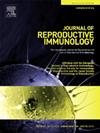Non-invasive blood tests for earlier diagnosis and treatment of endometriosis
IF 2.9
3区 医学
Q3 IMMUNOLOGY
引用次数: 0
Abstract
Endometriosis is a chronic condition characterized by the presence of endometrial-like tissue outside the uterus, leading to symptoms such as dysmenorrhea and chronic pain. It affects approximately 2–10 % of women of reproductive age and up to 50 % of those experiencing infertility, significantly impacting the healthcare system. Despite its prevalence, endometriosis presents in a variety of forms and phenotypes, partly due to the absence of a non-invasive biomarker for diagnosis. Early detection of endometriosis is crucial for effective management; however, the most dependable diagnostic method currently available is laparoscopy. Many women are reluctant to undergo this surgical procedure, resulting in a substantial number remaining unaware of their condition. This review aims to explore the potential of non-invasive blood tests in developing reliable biomarkers or a combination of biomarkers for the early detection and diagnosis of endometriosis. Innovative therapies such as immunomodulation, stem cell therapy, biosensors, and nanotheranostics present promising avenues for personalized diagnosis and treatment, focusing on genetic, epigenetic, and immunological aspects. The review emphasizes the importance of various biomarkers and the necessity for further research to enhance diagnosis and improve the quality of life for women affected by endometriosis.
无创血液检查对子宫内膜异位症的早期诊断和治疗
子宫内膜异位症是一种慢性疾病,其特征是子宫外存在子宫内膜样组织,导致痛经和慢性疼痛等症状。它影响了大约2 - 10% %的育龄妇女和高达50% %的不孕症妇女,严重影响了医疗保健系统。尽管子宫内膜异位症很普遍,但它呈现出多种形式和表型,部分原因是缺乏非侵入性生物标志物进行诊断。早期发现子宫内膜异位症是有效治疗的关键;然而,目前最可靠的诊断方法是腹腔镜检查。许多妇女不愿意接受这种手术,导致相当多的人仍然不知道自己的病情。本综述旨在探讨无创血液检测在开发可靠的生物标志物或生物标志物组合用于子宫内膜异位症早期检测和诊断方面的潜力。创新疗法,如免疫调节、干细胞治疗、生物传感器和纳米治疗,为个性化诊断和治疗提供了有希望的途径,重点是遗传、表观遗传和免疫学方面。这篇综述强调了各种生物标志物的重要性和进一步研究的必要性,以提高子宫内膜异位症妇女的诊断和改善生活质量。
本文章由计算机程序翻译,如有差异,请以英文原文为准。
求助全文
约1分钟内获得全文
求助全文
来源期刊
CiteScore
6.30
自引率
5.90%
发文量
162
审稿时长
10.6 weeks
期刊介绍:
Affiliated with the European Society of Reproductive Immunology and with the International Society for Immunology of Reproduction
The aim of the Journal of Reproductive Immunology is to provide the critical forum for the dissemination of results from high quality research in all aspects of experimental, animal and clinical reproductive immunobiology.
This encompasses normal and pathological processes of:
* Male and Female Reproductive Tracts
* Gametogenesis and Embryogenesis
* Implantation and Placental Development
* Gestation and Parturition
* Mammary Gland and Lactation.

 求助内容:
求助内容: 应助结果提醒方式:
应助结果提醒方式:


